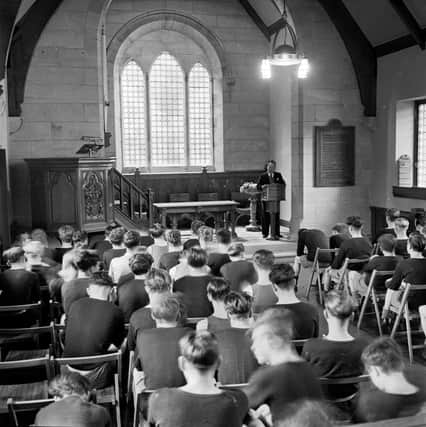Scottish schools: Compulsory religious worship is a breach of the basic human right to 'freedom of belief' – Fraser Sutherland


Currently the law in Scotland means that all primary and secondary schools must hold regular acts of religious observance “sufficiently frequently to have an impact on the spiritual development of the school community”.
Often religious observance takes the form of an assembly or other whole-school event, and will usually be Christian in tone in recognition of Scotland’s “long-standing Christian tradition”. Children and young people aged five to 18 do not have a say as to whether they take part in religious worship or not – no matter their own beliefs.
Advertisement
Hide AdAdvertisement
Hide AdHumanist Society Scotland has been campaigning for children and young people to be given the choice to opt out of compulsory worship for over six years, and in that time has created a broad coalition that includes some of Scotland's largest children's charities and organisations.
Along with LGBT Youth Scotland, Together Scotland, the Scottish Youth Parliament and the Scottish Council for Voluntary Organisations, we have campaigned for an opt-out system that puts the choice firmly in the hands of the child or young person in question.
Our humanist belief that any kind of religious worship or practice should be optional – if indeed it happens at all in a school setting, which is debatable – was bolstered by the findings of the 2016 United Nations Committee on the Rights of the Child (UNCRC) report on Scotland.
This stated that children should have the right to opt out of compulsory worship under the grounds of “freedom of belief” and should be able to “independently exercise their right to withdraw”.
While parents can withdraw their children, pupils cannot choose to withdraw themselves. Independence to make their own decisions within their maturity and capacity is key to protecting the human rights of children and young people in the eyes of the UN committee.
The lack of choice that Scotland’s children and young people face when it comes to compulsory religious observation is massively out of step with this. Especially if you consider the fact that 16-year-olds in Scotland can vote, marry, and join the army, while some young people under that age are judged capable enough by our courts to instruct a solicitor or make life-or-death medical decisions without parental approval.
Until the Scottish Government changes the current policy to allow for this much-needed opt-out, children and young people across Scotland are having their right to freedom of belief breached every day in Scottish schools.
The Scottish Government often positions itself as a modern, liberal, and progressive administration, but on this issue they are failing their own litmus test. They must listen to the calls for change that are not only coming from the United Nations but also from Scotland’s young people, those that represent them, and the majority of Scots.
Advertisement
Hide AdAdvertisement
Hide AdIn 2017, pollster Survation conducted research on the issue and found that 67 per cent of Scots supported giving children the right to choose to withdraw themselves from compulsory worship.
This is unsurprising given that the Scottish Social Attitudes survey found 58 per cent of the Scottish population report themselves to be ‘non-religious’, with this figure rising to a massive 74 per cent in those aged under 34. Modern Scotland is increasingly a country that embraces progressive social policies and where most people no longer subscribe to the views of the traditional arbitrators of morals in Scotland – the Christian churches.
The Children’s and Young People’s Commissioner Scotland – the independently appointed champion of children’s rights in Scotland – supports changing the law. Furthermore, he has stated his support for the findings of the UNCRC stems from his responsibility to “safeguard the rights of the child”.
The Commissioner has even gone as far as to urge the government to consider making religious worship ‘opt-in’ – a proposal worth serious consideration by both schools and parliament.
This issue has been around in the halls of Holyrood for more than six years, but since the UN report in 2016 nothing has changed. Education ministers have come, and they have gone, and they have all ignored the urgent reform needed.
Last week the Deputy First Minister – and former Education Secretary – John Swinney said he was ready to be “bold” on children's rights. If this boldness is the same we have experienced since 2016 then this much needed change will be coming in around 2050 – if we are lucky.
The time for action was six years ago, and change needs to happen now before another six years pass and a whole new generation of children have gone through school with compulsory worship as part of their school week.
In the wake of a pandemic that saw huge changes in our education system, the question is why have we exited this period with a school system that still forces children and young people to spend valuable school time on compulsory worship?
Advertisement
Hide AdAdvertisement
Hide AdWe now know without a shadow of a doubt that schools provide our young people with an education, but also mental health support, a space where they can develop social skills and friendships, a place to explore who they are. Why don’t we seize the opportunity to end the outdated practice of compulsory Christian worship in Scotland’s schools and use the time to bolster the mental health and social skills of our young people?
Humanist Society Scotland has for years fought to make sure that children in Scotland are granted their basic human right to “freedom of belief”, and we will continue to fight and raise awareness of this cause until the government makes good on their commitment to be “bold” on children's rights.
Fraser Sutherland is chief executive of the Humanist Society Scotland
Comments
Want to join the conversation? Please or to comment on this article.
